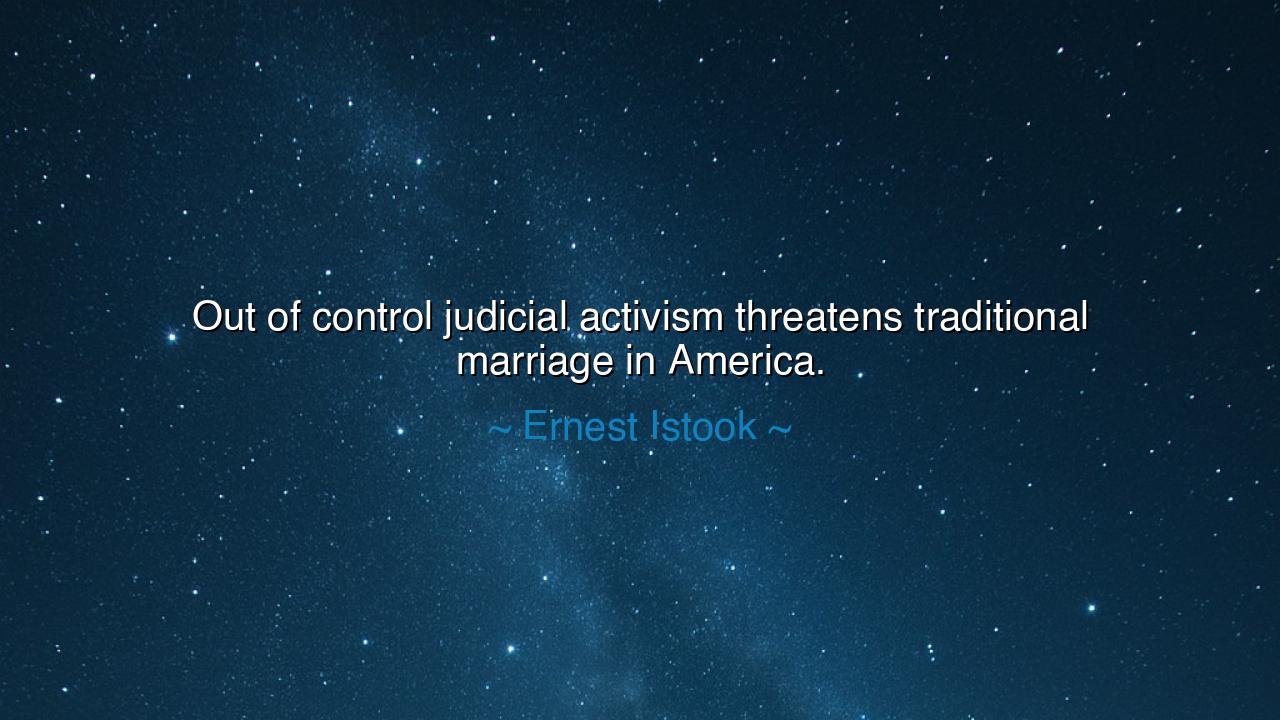
Out of control judicial activism threatens traditional marriage






“Out of control judicial activism threatens traditional marriage in America.” — Thus spoke Ernest Istook, a man of his time but echoing an argument as old as law itself: the tension between the guardians of justice and the will of the people. In his warning, we hear the voice of one who fears that the scales of balance — that delicate equilibrium between freedom and order, tradition and progress — are tipping too far, guided not by the people’s consent but by the interpretations of a few. His words are not merely a cry against a single ruling or court, but an invocation of a larger question that has haunted every civilization: who decides what is sacred, what is lawful, and what must endure?
In this quote, Istook speaks of judicial activism, a term born of deep unease — the belief that judges, entrusted to interpret the law, have begun instead to shape it, stepping beyond their duty into the realm of governance. To him, this overreach is not merely a legal concern, but a moral one, for it threatens what he calls traditional marriage, the union that, in his eyes and in the eyes of many before him, forms the cornerstone of society. Such a claim arises not from hatred of change, but from fear — fear that the very fabric of the family, long held as sacred, is being rewritten without the consent of those who live within it.
To understand the origin of these words, one must recall the great debates that roiled America in the early 21st century, when questions of marriage, identity, and law reached the nation’s highest courts. The Supreme Court’s decisions on same-sex marriage, civil rights, and equal protection became lightning bolts across the sky of public life. Some saw these rulings as the dawn of justice; others, like Istook, as the eclipse of democratic will. He stood among those who believed that the judiciary, though a noble institution, had wandered beyond its ancient mandate — that it was no longer interpreting law, but creating it, and in doing so, threatening traditions that had anchored generations.
Yet this struggle between law and tradition is not new. The ancients too faced it. In the time of Socrates, Athens wrestled with the tension between written law and moral duty. Socrates, condemned by the will of the people yet bound by his conscience, drank the hemlock rather than defy the law he had long obeyed. Later, in Rome, the jurist Cicero declared that true law is not decreed by the senate, nor written on parchment, but found in nature and reason itself — a law that cannot be changed by decree. So too, in America, the question endures: is law the servant of morality, or is morality to be reshaped by law? Istook’s lament is the cry of one who believes that the sword of justice must never cut through the roots of the culture it was meant to protect.
And yet, every age brings transformation. The institution of marriage has never been fixed in one form alone; it has evolved from arrangement to affection, from property to partnership. What one generation calls tradition, another calls progress. The courts that Istook warns against were, in truth, responding to the pleas of those who stood long excluded from the promise of equality. They too spoke the language of justice, invoking the Constitution as shield and sword alike. Thus, what Istook saw as judicial activism, others hailed as the flowering of liberty. History teaches that both perspectives hold a fragment of truth: change must come, but not so swiftly that it tears the heart from its own people.
The lesson, then, is not to choose sides blindly between activism and restraint, but to understand the balance they require. When the courts act, they must do so with humility — remembering that they interpret for a nation, not rule above it. When the people resist, they must do so with wisdom — remembering that justice often begins where comfort ends. The voice of the judge and the will of the people are both instruments in the symphony of a free society; discord arises only when one drowns out the other.
So, O listener, take this truth into your own life: whether in matters of law, faith, or love, balance is the mark of wisdom. Guard tradition where it holds goodness, and reform it where it breeds injustice. Question authority, but honor order. Cherish your freedoms, but remember that freedom demands responsibility. For as Istook’s warning reminds us, when power — be it judicial or political — escapes its bounds, the harmony of a people begins to falter. And only when reason and compassion walk hand in hand can justice endure — not as the will of the few, but as the peace of all.






AAdministratorAdministrator
Welcome, honored guests. Please leave a comment, we will respond soon